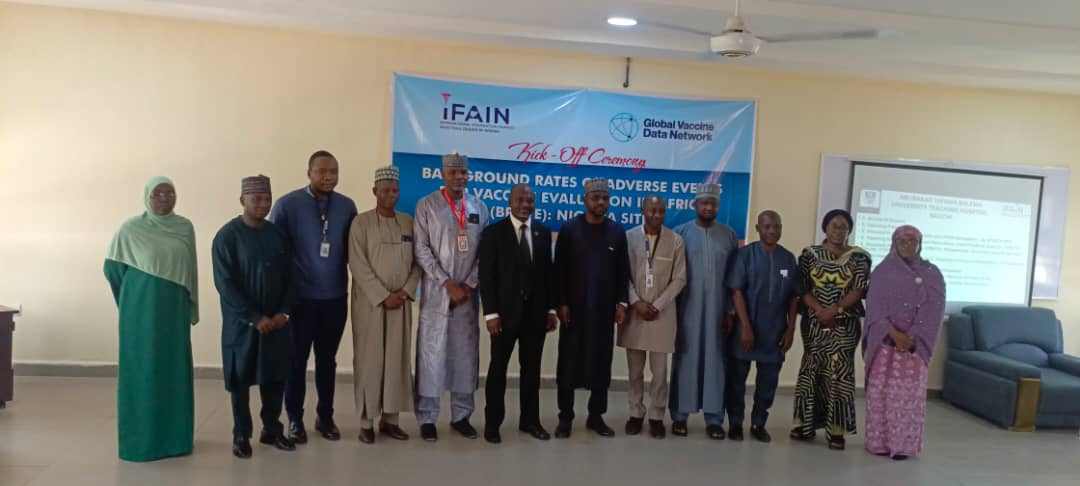By Khalid Idris Doya The International Foundation Against Infectious Disease in Nigeria (IFAIN), in partnership with the Globa...
By Khalid Idris Doya
The International Foundation Against Infectious Disease in Nigeria (IFAIN), in partnership with the Global Vaccine Data Network, has commenced the implementation of the Background Rates of Adverse Events for Vaccine Evaluation in Africa (BRAVE) project in Nigeria.
The project aims to enhance Nigeria’s capacity to monitor adverse events following immunization, with a strategic focus on preparing for the eventual rollout of Lassa fever vaccines.
Speaking during the kickoff ceremony of the project in Nigeria held at the Abubakar Tafawa Balewa University Teaching Hospital (ATBUTH) in Bauchi on Monday, Dr. Bernard Ebruke, Country Director for Research at IFAIN, explained that BRAVE is designed to collect baseline data on key health conditions before vaccines are introduced.
"We want to understand how common are those conditions in the population before the vaccine is introduced, such that when we continue to monitor, looking out for those vaccines, what they call surveillance, by the time the vaccine is introduced and we see there is a change in the population, we know that there is a change in the population.
"This helps us assess whether any changes observed afterward can be attributed to the vaccine or not. That is the core objective of the project."
Dr. Ebruke said.
He emphasised that establishing these background rates is essential to guide vaccine safety assessments and ensure evidence-based decision-making.
In addition, according to him, the BRAVE project will help strengthen Nigeria's healthcare system by building the capacity of health workers and improving data infrastructure.
He further said while high-income countries already have robust systems in place, many low- and middle-income countries like Nigeria are still developing such frameworks.
The project is currently being implemented in four African countries Nigeria, Ghana, Rwanda, and Kenya. It involves four sites in Nigeria: FMC Owo (Ondo State), Irrua Specialist Teaching Hospital (Edo State), University of Benin Teaching Hospital, and ATBUTH Bauchi, which serves as the lead implementation site.
Dr. Ebruke noted that the project will span three years, with a surveillance component extending to five years.
The first two years, he added, will focus on collecting data on background incidence rates of priority health conditions before the introduction of target vaccines.
Dr. Bernard Ebruke added that the project covers general vaccine safety, and it pays particular attention to Lassa fever due to the advanced stage of vaccine development globally.
He stressed that by the time Lassa vaccines are introduced, Nigeria will already have solid pre-vaccine data to inform post-vaccination monitoring.
For her part, Dr. Amina Mohammed, Chief Facilitator for the BRAVE Project at ATBUTH, said data will be collected from patients admitted to three departments include Pediatrics, Obstetrics and Gynecology (O&G), and Internal Medicine, using a predefined list of priority conditions.
"This initiative will generate essential epidemiological insights not only for Bauchi State but also for surrounding states, since ATBUTH serves a wide catchment area," she explained.
Also speaking, the Chief Medical Director of ATBUTH, Dr. Bara Jibrin, described the hospital's selection as the national pioneer site for BRAVE as a validation of its growing research capacity.
"Our inclusion signals that we’ve met international standards in infrastructure, human resources, and research preparedness. This project paves the way for us to begin vaccine and drug trials, starting with Lassa fever, and more are already being discussed," he said.
Dr. Jibrin stressed the importance of establishing pre-vaccination data to distinguish naturally occurring health events from potential side effects of new vaccines.
"This project tells our current and future partners that we are ready. We already have critical baseline data, and this positions us strongly for upcoming vaccine and drug development collaborations," he added.











No comments